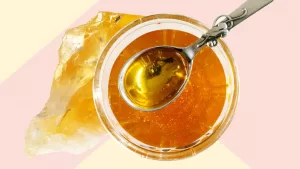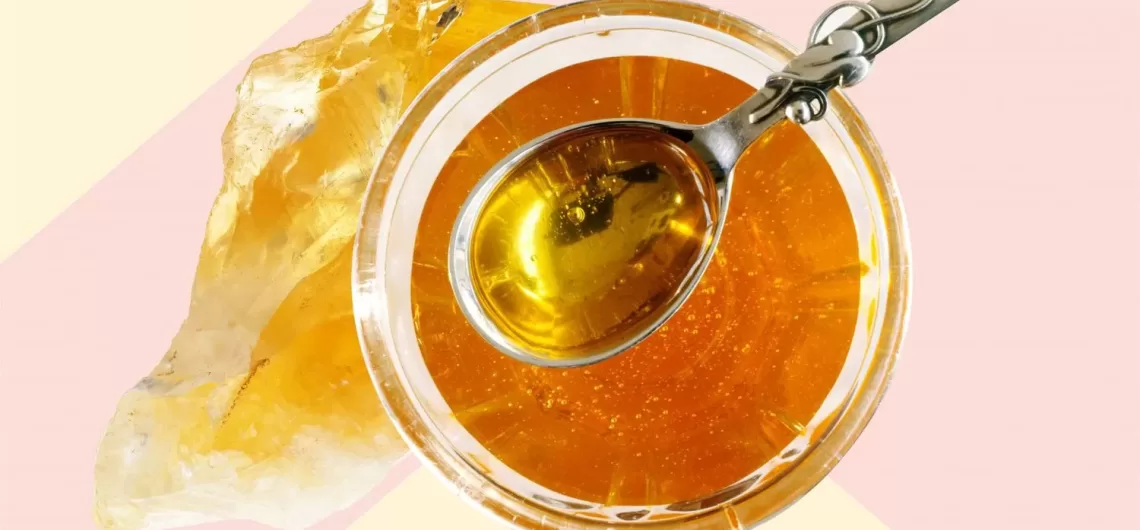Healthy benefits
People have used honey for thousands of years for its natural sweetening properties and medicinal benefits. Some of the potential benefits of honey include:

- Honey contains antioxidants that can protect cells from damage caused by free radicals. Which are associated with chronic diseases like cancer and heart disease.
- Soothes sore throat and cough: It has antibacterial and anti-inflammatory properties that can help soothe a sore throat and calm a cough. People have used it as a natural cough suppressant for centuries.
- Boosts energy: Honey is a source of natural sugars such as fructose and glucose. Which can provide a quick energy boost. Using it in cooking and baking provides a great alternative to refined sugars.
- Promotes wound healing: Has antibacterial and anti-inflammatory properties that can help promote wound healing. People have used it to treat burns, cuts, and other skin injuries.
- Supports digestive health: It contains prebiotics, which can help promote the growth of beneficial bacteria in the gut. It can also help soothe digestive issues such as constipation and bloating.
- May help improve cholesterol levels: Studies have shown that honey may help improve cholesterol levels by reducing levels of LDL (bad) cholesterol and increasing levels of HDL (good) cholesterol.
Overall, honey can be a beneficial addition to a healthy diet and lifestyle. It is important to note that people should consume honey in moderation because it is still a form of sugar.
Uses
For thousands of years, people have used honey for various purposes, both as a food and as a natural remedy. Here are some of the most common uses.
- Makes a great substitute for sugar and people can use it to sweeten tea, coffee, and other beverages.
- People often use honey as an ingredient in baking recipes, marinades, and salad dressings, among other dishes.
- As a natural remedy: Has antibacterial and anti-inflammatory properties, which make it useful for treating coughs, sore throats, and other respiratory ailments. You can also achieve soothing minor burns and cuts using it.
- Using honey as a natural moisturizer for the skin and incorporating it as an ingredient in many skincare products can help reduce inflammation and redness.
- Haircare: Can be used as a natural conditioner for hair, leaving it soft and shiny.
- Energy booster: It is a good source of carbohydrates, which makes it a natural energy booster. Many athletes use honey as a natural pre-workout energy source.
- People have used honey for centuries as a natural preservative for fruits, vegetables, and other foods due to its long shelf life.
Overall, honey is a versatile natural product that has many uses in both food and medicine.
Properties
For thousands of years, people have used the natural sweet substance produced by honey bees from the nectar of flowers for its medicinal and culinary properties. Here are some properties of honey:
- Sweetness: Its a natural sweetener and is often used as a healthier alternative to sugar.
- Nutritional value: It is a rich source of vitamins and minerals, including potassium, calcium, magnesium, and vitamin C.
- Antioxidant properties: Contains antioxidants that help protect the body against damage from free radicals.
- Antibacterial properties: Has natural antibacterial properties that can help fight infections and promote wound healing.
- Anti-inflammatory properties: Has anti-inflammatory properties that can help reduce inflammation in the body.
- Moisturizing properties: It is a natural humectant, which means it can help keep skin hydrated and moisturized.
- Low water activity: Has a low water activity, which means it has a long shelf life and is less likely to spoil.
- Flavor: Honey has a distinct flavor that can vary depending on the type of flower from which the nectar was gathered.
- Texture: Can have different textures, ranging from thick and viscous to runny and smooth.
- The color of honey can vary in shade, from light yellow to dark brown, depending on the type of flower from which bees gather the nectar.
